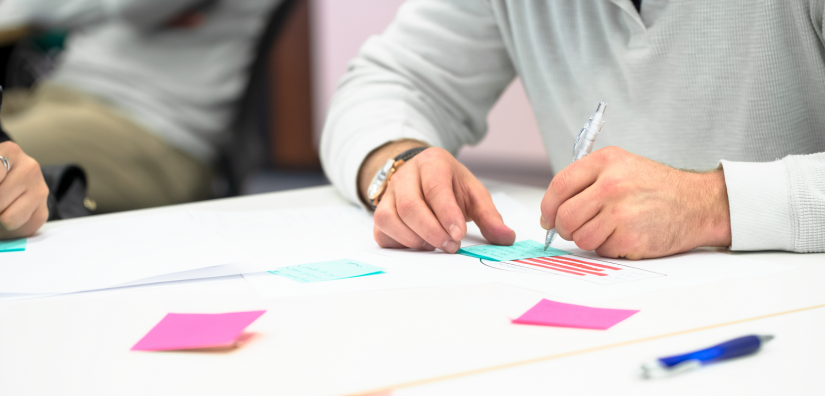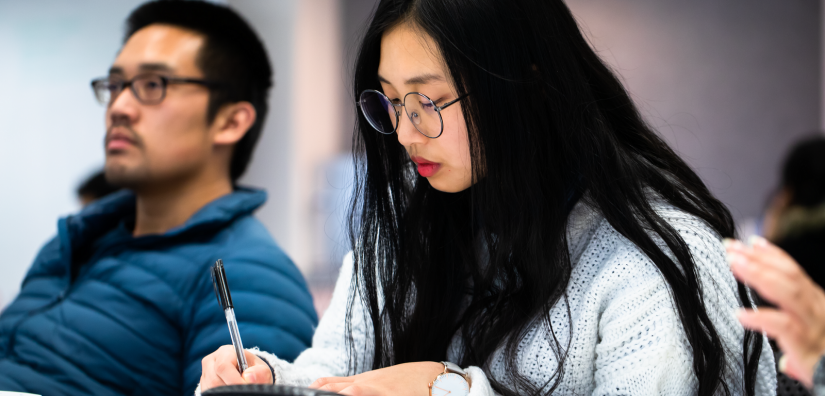
From working alongside algae accelerators to students in forensic crime labs, Helena Asher works as the Science Faculty and Graduate School of Health (GSH) career consultant in UTS Careers where she has been helping students plan and navigate their career development for the past six years. Pioneering innovative teaching styles and collaboration with Faculty as part of the Curriculum Career Development team in UTS Career, she and the team have been recognised at the 2018 UTS Learning and Teaching Awards for excellence in team-led education. We spoke with Helena about a new workshop, based on design thinking methodologies, being developed for students who are experiencing confusion around planning their career trajectories, based.
So, you get to work with a real mix of disciplines across the faculty, give us an insight into your role and what you do each day?
On a typical day, I’m out of the office, running workshops within Science or GSH. I run a range of activities to help students develop self-awareness and soft skills. I also meet with students who might be experiencing confusion around their career direction or who might want a sounding board as to whether they are on the right path. Every day is different!
And you obviously like being in the Science and GSH space, why?
Its unique, working within these faculties because there are so many options around what’s possible. The world is changing at lightning speed; career data is showing that traditional degree pathways are much less limited. For example, a medical science student might want to develop applications and
interventions alongside a software developer or coder, and then they may need a marketing student to join forces to launch a brand-new startup business capable of global influence; that would not have been so easy even a decade ago.
The environment here is positive for students who want to get creative, and collaborative, with their career trajectories.
It seems that UTS does foster innovative approaches, do you think there’s anything else that students here can boast when it comes to speaking with potential employers?
My sense is that students here at UTS are very practical. We know that UTS students are in demand and there is a reason for that. It's not just about a great transcript; so many students I speak to are working in conjunction with study. Being driven by curiosity and a desire to develop makes our students extremely sought after. When I studied, I felt that grades were a lot more important, whereas now, they are part of the picture but not all of it. Hands-on experience really adds to student development and we do that well here.
A part of your role is to deliver training through workshops; why do we run workshops? Why wouldn’t we just send a pdf to students?
Don’t get me wrong, digital content is vital. However, human beings are experiential, people learn in different ways and we need a mix. We like to learn with other people around us through sharing, experiencing things and collaborating. A workshop caters for different levels of understanding, we deliver information with constant feedback occurring and knowledge being shared. In this way, different learning styles are catered for. We also try to focus on application, that’s a key element.
The “Designing your Career” workshop is one which you’ve developed here at UTS, tell us about this workshop and what it involves.
It’s based on a book written by Bill Burnett and David Evans, two Stanford professors who work with students and professionals around holistic life-design by using design principles.
“It's about thinking creatively, beyond what a career ‘should’ look like, to what it could look like. We are working to break the model of the traditional careers service by offering something new.”

How does design thinking apply to career planning?
By using ideation principals, we are exploring the creative possibility. We are not worried about finding a quick solution, we’re open to the breadth of possibilities available.
Often the dreaded question in any career planning setting, is ‘what do I do with my life?’; which is hard because there are many facets to that question. Often a person's thinking may be limited by societal expectations, culture, familiar pathways, things like that. By exposing students to imaginative and creative ‘play’, we help them start to reframe these hard-wired concepts. Just because a job doesn’t exist, doesn’t mean it can’t be created by someone, or exist very soon somewhere.
Are there any ‘light bulb moment’ moments that happen?
The ‘lightbulb moment’ often happens during the ideation phase of the workshop, when suddenly, a student can see the connections between the idea and the steps that would make it possible; the abstract becoming a reality. This process can be significant, especially for people from a scientific background, where they are not used to thinking this way. Our brains are wired to fight, freeze or fly. We shut ideas down, we fear judgement. These workshops offer the chance for students to glimpse into a different way of planning and working.
What advice would you give to someone who is wanting to rethink a career path?
It’s fun to imagine, and it's a vital skill to cultivate, whether in relation to career planning or otherwise.
A chance to zoom out, let ideas have time to evolve, all these things are helpful. Often there are answers within our subconscious minds and the best way to tease those out is to give ourselves the opportunity and the time to do that.
Helena Asher-Chiang is an experienced Careers Consultant who has been working with UTS Careers for over half a decade. In her past life, she worked as a Teacher, a Recruiter and Human Resources Professional. She delights in helping students to discover their own potential and loves speaking with strangers about their dreams, aspirations and working lives.
https://www.linkedin.com/in/helenaasher/

